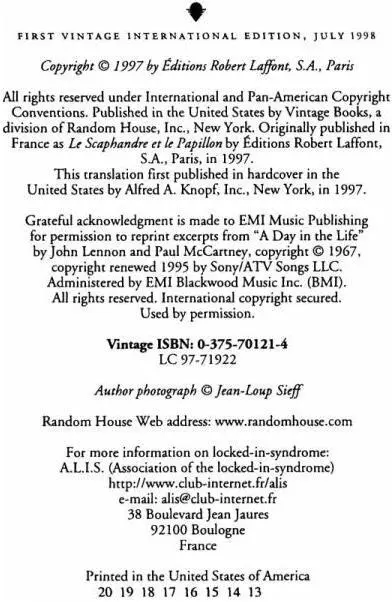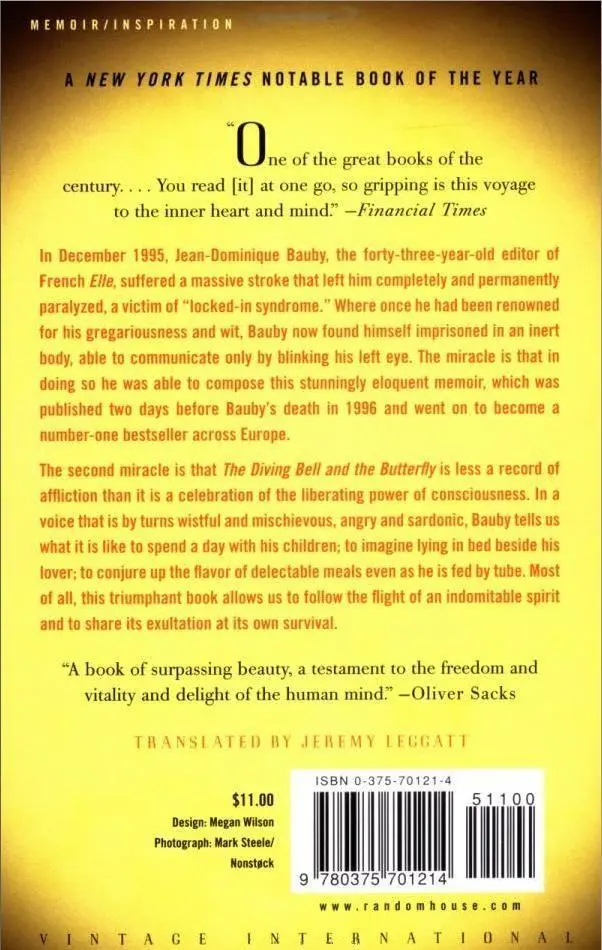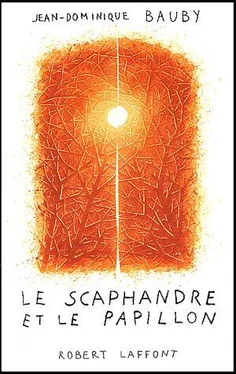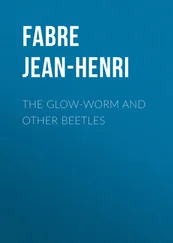Jean-Dominique Bauby
THE DIVING BELL AND THE BUTTERFLY
A Memoir of Life in Death
Translated from French by Jereny Leggatt
For my children, Théophile and Céleste…
And my deepest gratitude to Claude Mendibil,
whose all-important contribution to these pages
will become clear as my story unfolds
The editor-in-chief of French Elle , Jean-Dominique Bauby suffered a stroke that resulted in locked-in syndrome when he was 43 years old. He died just two days after the French publication of his book.


Through the frayed curtain at my window, a wan glow announces the break of day. My heels hurt, my head weighs a ton, and something like a giant invisible diving bell holds my whole body prisoner. My room emerges slowly from the gloom. I linger over every item: photos of loved ones, my children's drawings, posters, the little tin cyclist sent by a friend the day before the Paris—Roubaix bike race, and the IV pole hanging over the bed where I have been confined these past six months, like a hermit crab dug into his rock.
No need to wonder very long where I am, or to recall that the life I once knew was snuffed out Friday, the eighth of December, last year.
Up until then, I had never even heard of the brain stem. I've since learned that it is an essential component of our internal computer, the inseparable link between the brain and the spinal cord. I was brutally introduced to this vital piece of anatomy when a cerebrovascular accident took my brain stem out of action. In the past, it was known as a “massive stroke,” and you simply died. But improved resuscitation techniques have now prolonged and refined the agony. You survive, but you survive with what is so aptly known as “locked-in syndrome.” Paralyzed from head to toe, the patient, his mind intact, is imprisoned inside his own body, unable to speak or move. In my case, blinking my left eyelid is my only means of communication.
Of course, the party chiefly concerned is the last to hear the good news. I myself had twenty days of deep coma and several weeks of grogginess and somnolence before I truly appreciated the extent of the damage. I did not fully awake until the end of January. When I finally surfaced, I was in Room 119 of the Naval Hospital at Berck-sur-Mer, on the French Channel coast—the same Room 119, infused now with the first light of day, from which I write.
An ordinary day. At seven the chapel bells begin again to punctuate the passage of time, quarter hour by quarter hour. After their night's respite, my congested bronchial tubes once more begin their noisy rattle. My hands, lying curled on the yellow sheets, are hurting, although I can't tell if they are burning hot or ice cold. To fight off stiffness, I instinctively stretch, my arms and legs moving only a fraction of an inch. It is often enough to bring relief to a painful limb.
My diving bell becomes less oppressive, and my mind takes flight like a butterfly. There is so much to do. You can wander off in space or in time, set out for Tierra del Fuego or for King Midas's court.
You can visit the woman you love, slide down beside her and stroke her still-sleeping face. You can build castles in Spain, steal the Golden Fleece, discover Atlantis, realize your childhood dreams and adult ambitions.
Enough rambling. My main task now is to compose the first of these bedridden travel notes so that I shall be ready when my publisher's emissary arrives to take my dictation, letter by letter. In my head I churn over every sentence ten times, delete a word, add an adjective, and learn my text by heart, paragraph by paragraph.
Seven-thirty. The duty nurse interrupts the flow of my thoughts. Following a well-established ritual, she draws the curtain, checks tracheostomy and drip feed, and turns on the TV so I can watch the news. Right now a cartoon celebrates the adventures of the fastest frog in the West. And what if I asked to be changed into a frog? What then?
I had never seen so many white coats in my little room. Nurses, orderlies, physical therapist, occupational therapist, psychologist, neurologist, interns, and even the department head—the whole hospital had turned out for the event. When they first burst in, pushing the conveyance ahead of them, I thought it meant that I was being ejected to make room for a new patient. I had already been at Berck a few weeks and was daily drawing nearer to the shores of awareness, but I still could not imagine any connection between a wheelchair and me.
No one had yet given me an accurate picture of my situation, and I clung to the certainty, based on bits and pieces I had overheard, that I would very quickly recover movement and speech.
Indeed, my roving mind was busy with a thousand projects: a novel, travel, a play, marketing a fruit cocktail of my own invention. (Don't ask for the recipe; I have forgotten it.) They immediately dressed me. “Good for the morale,” pronounced the neurologist in sententious tones. And in truth I would have been pleased to trade my yellow nylon hospital gown for a plaid shirt, old pants, and a shapeless sweater—except that it was a nightmare to put them on. Or rather to watch the clothes manipulated, after endless contortions, over these uncooperative deadweight limbs, which serve me only as a source of pain.
When I was finally dressed, the ritual could begin. Two attendants seized me by the shoulders and feet, lifted me off the bed, and dumped me unceremoniously into the wheelchair. I had graduated from being a patient whose prognosis was uncertain to an official quadriplegic. They didn't quite applaud, but they came close. My caretakers made me travel the length and breadth of the hospital floor, to make certain that the seated position did not trigger uncontrollable spasms, but I was too devastated by this brutal down-grading of my future hopes to take much notice. They had to place a special cushion behind my head: it was wobbling about like the head of one of those African women upon removal of the stack of rings that has been stretching her neck for years. “You can handle the wheelchair,” said the occupational therapist, with a smile intended to make the remark sound like good news, whereas to my ears it had the ring of a life sentence. In one flash I saw the frightening truth. It was as blinding as an atomic explosion and keener than a guillotine blade. They all left.
As three orderlies laid me back down, I thought of movie gangsters struggling to fit the slain informer's body into the trunk of their car. The wheelchair sat abandoned in a corner, with my clothes tossed over its dark-blue plastic backrest. Before the last white coat left the room, I signaled my wish to have the TV turned on, low. On the screen was my father's favorite quiz show. Since daybreak, an unremitting drizzle had been streaking my windows.
Oddly enough, the shock of the wheelchair was helpful. Things became clearer. I gave up my grandiose plans, and the friends who had built a barrier of affection around me since my catastrophe were able to talk freely. With the subject no longer taboo, we began to discuss locked-in syndrome. First of all, it is very rare. It is small consolation, but the chances of being caught in this hellish trap are about as likely as those of winning the lottery. At Berck, only two of us were locked in, and my own case was not classic. I am able to swivel my head, which is not supposed to be part of the clinical picture. Since most victims are relegated to a vegetable existence, the evolution of the disease is not well understood. All that is known is that if the nervous system makes up its mind to start working again, it does so at the speed of a hair growing from the base of the brain. So it is likely that several years will go by before I can expect to wiggle my toes.
Читать дальше














